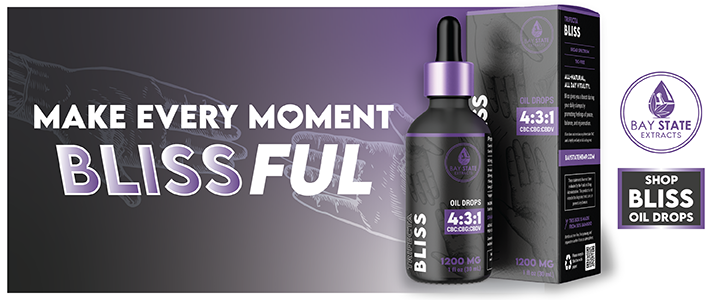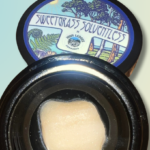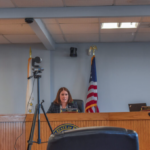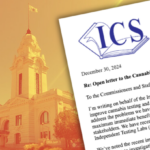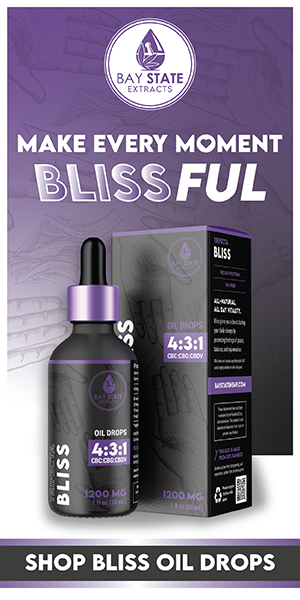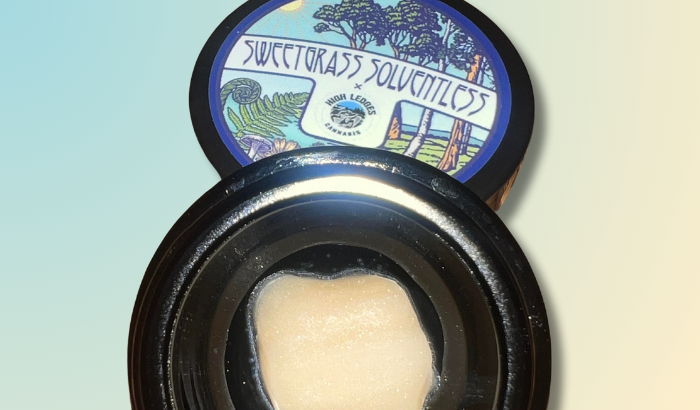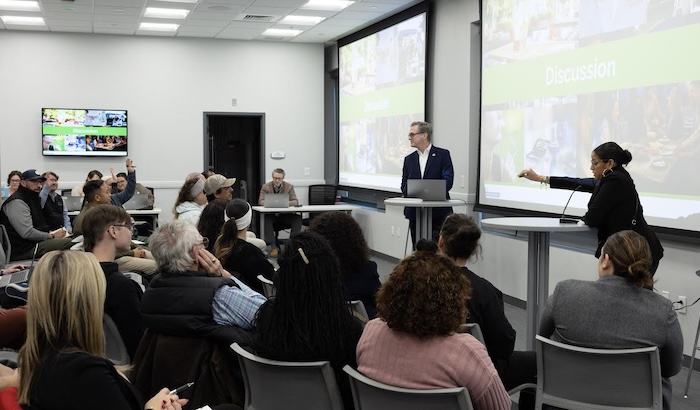
From proposed Massachusetts Social Consumption Establishment license fees and caps to ventilation regulations and next steps
Please note that while we repurposed some of our past coverage below where it was helpful, this post is different from an email sent to Talking Joints Memo subscribers on Tuesday. That piece, 10 Things To Consider With Today’s Draft Social Consumption Regulations, is mostly analysis, while this article is more of a summary of highlights from the proposed regulations. -CF
Despite the inaccurate reporting and assumptions of a lot of major outlets covering the advent of social consumption in Massachusetts, it’s still going to take several months or more before you can legally smoke in a venue on main street in your city or town. With that said, the Cannabis Control Commission is finally advancing the issue, and today members introduced draft regulations for licensing Social Consumption Establishments (SCEs).
On Dec. 6, the agency’s Social Consumption Working Group outlined a general framework, and during today’s meeting, CCC members and staffers started a “review” of “red-lined social consumption regulations.” At a macro level, they’re proposing three distinct on-site social consumption license classes: Supplemental, Hospitality, and Event Organizer. At a micro level, the details are already dizzying. Here are some initial highlights from the working proposal …
Helpful language and definitions
“Supplemental On-site Consumption,” which will likely be the first kind of SCE we see, “means a type of license … where a Marijuana Establishment (Retailer, Cultivator, Product Manufacturer, Microbusiness, Craft Marijuana Cooperative, or Delivery Operator) may sell Marijuana or Marijuana Products to Consumers in a designated Consumption Area within or attached to the Marijuana Establishment’s Premises.”
Next up, “Hospitality On-site Consumption means a type of license … where an individual or entity may establish a new business or operate within an existing Non-Cannabis Business to sell Marijuana and Marijuana Products to Consumers for consumption within the Social Consumption Establishment’s Premises and in designated Consumption Areas.”
How the proposed Event Organizer license type works
Already one of the most anticipated opportunities to follow recent announcements about social consumption, the rules for licensed promoters seem extremely generous—especially if you consider that one person or entity can hold three licenses (see below under “License caps and exclusivity” for more on that). Asked about the range of business possibilities during a media availability on Tuesday, Commissioner Nurys Camargo said the parameters they are eyeing are necessary.
“For some folks we spoke to, it’s almost like the trend is moving very quickly,” said Camargo, who communicated with social consumption stakeholders in other states and even led a fact-finding trip to California. “We’re seeing places pop up all over the country. In one particular state, having a location attached to the dispensary wasn’t bringing the foot traffic they thought it would. You have to engage, and you have to move with the times. Think about the pop-ups, think about the curated events, think about our seniors, think about affinity markets.”
The draft regulations propose: “A Marijuana Event Organizer shall organize no more than 24 Temporary Consumption Events per year. Applications for the approval of the Temporary On-site Consumption Permit shall include the location or address of the Temporary Consumption Event and shall be submitted no later than 120 days prior to the date of the Temporary Consumption Event.”
Furthermore, “A Marijuana Event Organizer shall obtain a Temporary On-site Consumption Permit prior to the event start date. A Marijuana Event Organizer may be granted approval of Temporary On-site Consumption Permit for a single day and up to five consecutive days. No Temporary On-site Consumption Permit shall be approved for longer than 5 consecutive days.”
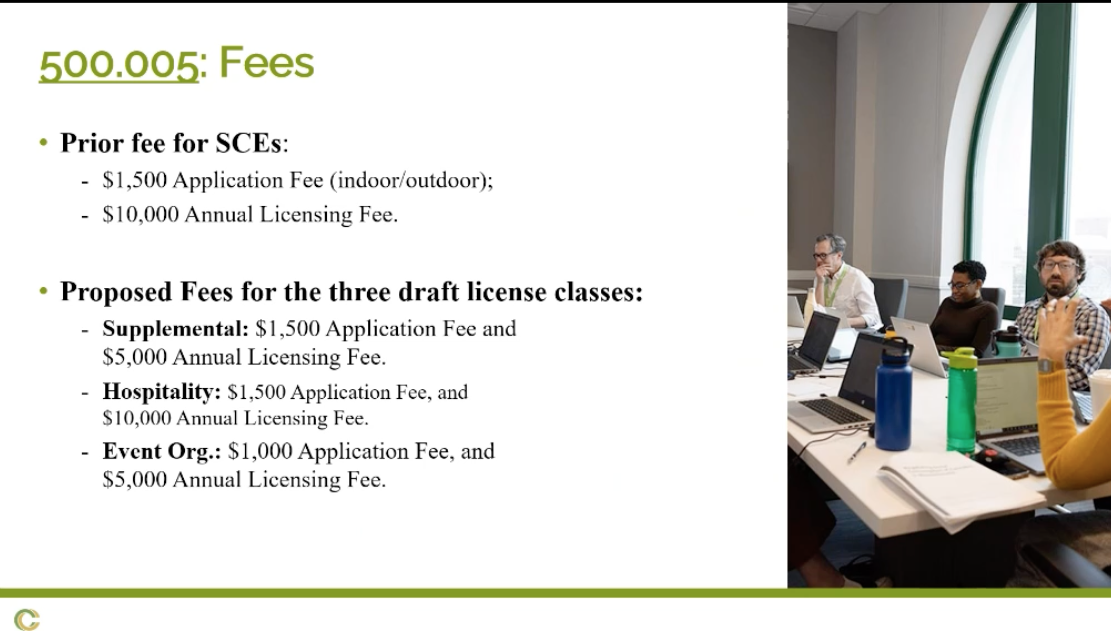
Social Consumption Establishment licensing fees
The currently proposed fees for SCEs are $1,500 for an initial “Application Fee (indoor/outdoor),” and up to $10,000 for the “Annual Licensing Fee.” The fees break down by the three draft license classes as follows: “Supplemental: $1,500 Application Fee and $5,000 Annual Licensing Fee”; “Hospitality: $1,500 Application Fee, and $10,000 Annual Licensing Fee”; “Event Org.: $1,000 Application Fee, and $5,000 Annual Licensing Fee.”
“We’re proposing to keep [fees] lower because it may be someone we already know, and we’re trying to keep consistent with the application fees starting with an annual fee that is consistent with a retailer or a delivery operator as well,” Commissioner Bruce Stebbins said. The acting CCC chair, Stebbins led the body’s social consumption initiative with Commissioner Camargo.
License caps and exclusivity
Under the “Control Limitations” section, the proposed regulations limit “Individuals and entities … to 3 licenses per class (9 in total).”
The draft regulations also include a 60-month exclusivity period for certain license types, up from 36 months in prior renditions. The proposed language reads: “Establishment licenses shall be limited on an exclusive basis to businesses controlled by and with majority ownership comprised of Social Equity Businesses; Economic Empowerment Priority Applicants; or Social Equity Program Participants; or Microbusinesses and Craft Marijuana Cooperatives, for a period of 60 months from the date the first Hospitality On-site Consumption Licensee receives a notice to commence operations.”
After five years, “the Commission may, by vote, decide to extend that period following a determination that the goal of the exclusivity period to promote and encourage full participation in the regulated Marijuana industry by people from communities that have previously been disproportionately harmed by Marijuana prohibition and enforcement of the law, by farmers, and by businesses of all sizes, has not been met.”
Indoor combustion
One of the big anticipated tangents of social consumption relates to the requirements around indoor smoke filtration, ventilation, etc. These measures can be very costly, and commissioners have said those hurdles are part of the reason they also included license types that would have fewer requirements, like outdoor operations. There’s also language that would allow the commission to greenlight new efficient ventilation tech and other products that may come on to the market after regulations are approved without a messy rewrite of the rules.
More to come on this topic as details get drilled down, but here’s what it says in the proposed regulations: “Indoor Smoking Consumption Area means a location where Consumers may consume Marijuana or Marijuana Products through combustion smoke, heat, vaporization, or aerosolization, in addition to Edibles, MIPs, and Beverages, in an enclosed space on the Premises of a Social Consumption Establishment. An Indoor Smoking Consumption Area shall maintain an adequate filtration system to meet the requirements of [Massachusetts state law].”
Furthermore, “Indoor Smoking Consumption Areas shall be separated from retail sale areas by walls or other barriers and approved by the Commission.”
This means a lot of new SOPs
Anyone who is looking to get in on the SCE action should start checking the draft regulations for hints at the infinite new standard operating procedures that will be needed. Some of the things that regulators will be looking for include …
“Marijuana Retailers applying for a Supplemental On-site Consumption License shall submit standard operating procedures to ensure that products purchased for consumption in the Supplemental On-site Consumption’s Premises are distinguished from products purchased for retail sale which are not to be consumed on the Premises.”
“A Social Consumption Establishment shall provide Consumers access to noninfused food and water. Nothing in 935 CMR 500.050, shall exempt the Social Consumption Establishment from obtaining all necessary licenses, permits, or local approvals required for food handling and service.”
They’re devising a “Social Consumption Core Curriculum”
Along with the new SOPs on the business side, the CCC will be writing guidelines for teaching agents about: “De-escalating dangerous situations”; “Attending to Medical or public safety emergencies”; “Investigations”; “Checking ID”; “Recognizing signs of impairment from alcohol and cannabis use”; “Regulations requirements for SCEs”; “Other trainings determined by the Commission.”
Medical patients can BYOC
Commissioners have thought a lot about equity and access in putting their draft together, including by inserting wording that would allow patients to bring their own weed under certain conditions. It’s a bit cumbersome, and maybe unrealistic, but it’s the thought that counts. Med patients and advocates were consulted, and we’ll see what they have to say in the upcoming weeks. For now, the draft reads …
“A Social Consumption Establishment may allow a Registered Qualifying Patient aged 21 or older to bring their own Medical-use Marijuana from an MTC, or allow the Qualifying Patient to order delivery of Medical-use Marijuana from an MTC, after presenting a valid Registration Card. If allowed, the Social Consumption Establishment shall place a sign informing Qualified Medical Patients of their privileges within a Social Consumption Establishment. The Registered Qualifying Patient shall not share their Medical-use Marijuana with other Consumers or Registered Qualified Patients.”
Decisions hopeful licensees will have to make
In order for the CCC to streamline the “application process for MEs applying for Supplemental On-site Consumption,” those who decide to take the plunge must pick which license class (Supplemental, Hospitality, or Event Organizer) they’re interested in, and what kind of consumption areas they’ll have (Non-Smoking, or Indoor and/or Outdoor Smoking). If they’re in the latter class and organizing events, they will have to decide if they plan on storing products or not.
There’s a lot of language in the draft pertaining to the “warehousing” of weed, including: “If a Marijuana Event Organizer chooses to Warehouse Marijuana or Marijuana Products, it shall Warehouse Marijuana and Marijuana Products at its Principal Place of Business.”
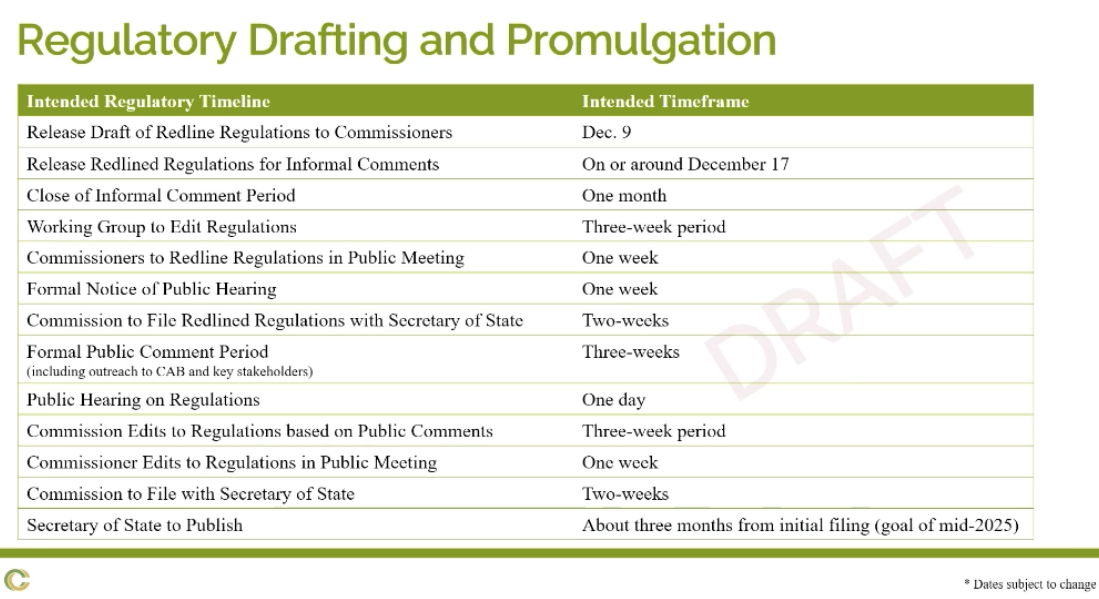
Next steps for social consumption in Massachusetts
An “informal public comment period” on these regulations opened today, technically after commissioners approved the release of the hereinmentioned draft. Industry stakeholders and other members of the public have until Jan. 23, 2025 to submit written comments. People can send testimony via commission@cccmass.com with the subject heading “Social Consumption.”
“All those comments and suggestions that commissioners are going to have will be helpful because we can include that in the next line by line, word for word redline [meeting] that we have,” Camargo said at Tuesday’s meeting.
When that comment window closes, an estimated three-week period will commence for the Social Consumption Working Group to edit the regs. Then a week for “Commissioners to Redline Regulations in Public Meeting,” then a “Formal Notice of Public Hearing,” then two weeks for the “Commission to File Redlined Regulations with Secretary of State,” followed by a three-week “Formal Public Comment Period,” in which Cannabis Advisory Board Members and key stakeholders will chime in.
After that, there will be a public hearing, then more edits, and eventually a public meeting to nail down the final language. Which, by CCC estimates, puts the publishing date in “mid-2025.”


